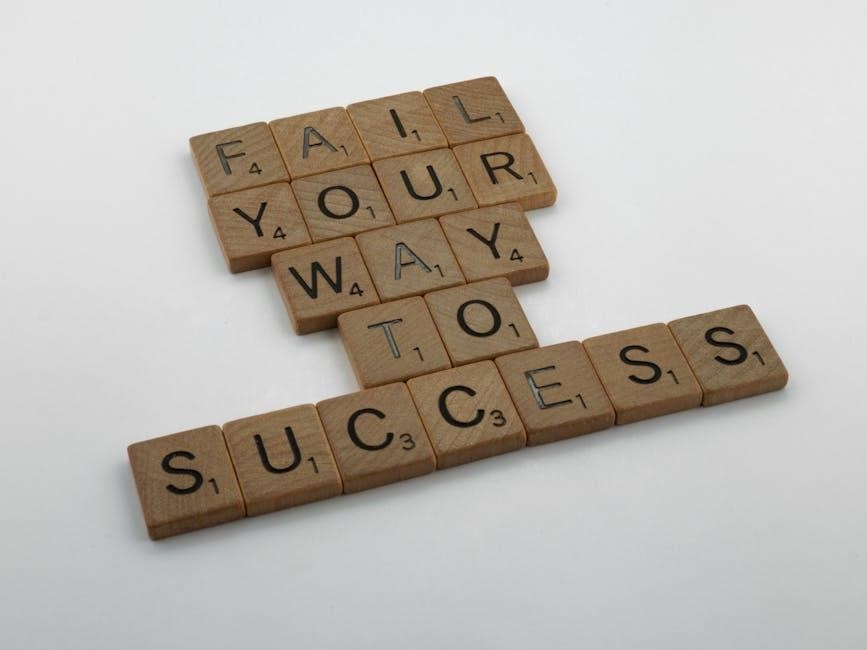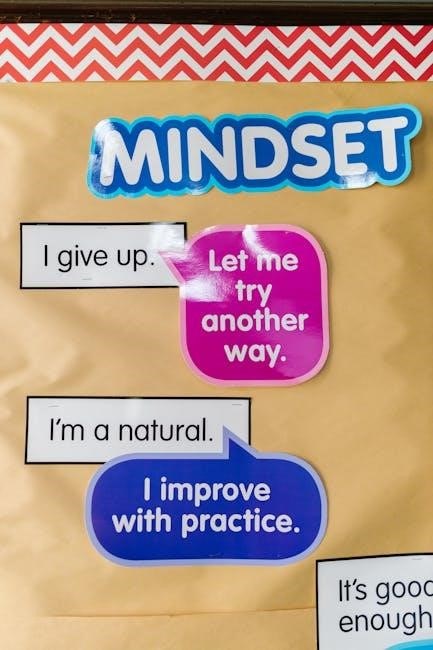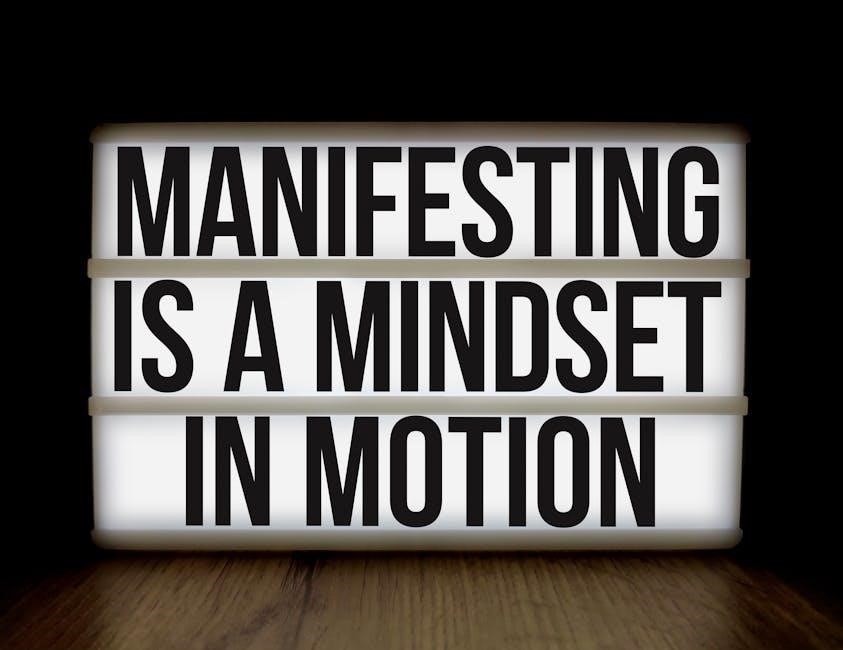A growth mindset, developed by Dr. Carol Dweck, is the belief that abilities can be enhanced through effort and perseverance, fostering resilience and lifelong learning.
Definition of Growth Mindset
A growth mindset, as defined by Dr. Carol Dweck, is the belief that abilities and intelligence can evolve through effort, learning, and perseverance. Unlike a fixed mindset, which assumes talents are innate and unchangeable, a growth mindset embraces challenges as opportunities for growth. It emphasizes that success is achieved through dedication and persistence, fostering resilience and a love for learning. This mindset encourages individuals to view obstacles as stepping stones rather than insurmountable barriers, promoting continuous improvement and personal development over time.
Key Differences from Fixed Mindset
The primary distinction lies in beliefs about ability. A fixed mindset assumes talents are innate and unchangeable, leading individuals to avoid challenges and persist less in the face of obstacles. In contrast, a growth mindset views abilities as developable through effort and learning. This fosters resilience, adaptability, and a willingness to embrace challenges as growth opportunities. While a fixed mindset fears failure, a growth mindset sees it as a pathway to improvement and mastery.
Importance of Understanding Mindsets
Recognizing the distinction between fixed and growth mindsets is crucial for personal and professional development. Understanding these mindsets empowers individuals to identify their own beliefs and behaviors, fostering self-awareness and intentional growth. In educational settings, educators can create supportive environments that encourage effort and resilience rather than focusing solely on talent. By understanding mindsets, individuals and organizations can unlock potential, enhance learning, and cultivate a culture of continuous improvement and adaptability. This awareness is foundational for overcoming challenges and achieving long-term success.
Benefits of a Growth Mindset
A growth mindset fosters increased enjoyment in learning, improves academic performance, and enhances resilience. It reduces dishonesty, encourages tackling challenges, and boosts confidence in overcoming obstacles.
Increased Enjoyment in Learning
A growth mindset significantly enhances the enjoyment of learning by fostering curiosity and a love for discovering new ideas. When individuals embrace challenges as opportunities for growth, they find learning more engaging and rewarding. This mindset encourages persistence through obstacles, leading to a greater sense of accomplishment and satisfaction. By viewing effort as a path to improvement, learners develop a deeper enjoyment of the educational process, making it more fulfilling and meaningful over time.
Improved Academic Performance
Adopting a growth mindset leads to improved academic performance by fostering a focus on progress and effort over results. Students who believe their abilities can develop through hard work approach challenges with greater determination, leading to better grades and higher achievement. This mindset encourages persistence, effective problem-solving, and the use of feedback for improvement, ultimately enhancing overall academic success and intellectual growth.
Enhanced Resilience and Adaptability
A growth mindset strengthens resilience by teaching individuals to view challenges as opportunities for growth rather than insurmountable obstacles; People with this mindset persist through setbacks, embracing difficulties as temporary and solvable. This adaptability fosters confidence in navigating complex situations and uncertainty. By focusing on effort and learning, individuals develop problem-solving skills and emotional stamina, enabling them to thrive in diverse contexts and achieve both personal and professional growth.
Reduced Cheating and Dishonesty
A growth mindset reduces cheating and dishonesty by prioritizing learning over appearances of success. Students and individuals feel less pressure to conceal their struggles, instead embracing challenges and viewing mistakes as opportunities for growth. This shift fosters integrity, as the focus transitions from achieving perfection to understanding and improvement. By valuing effort and persistence, a growth mindset cultivates an environment where honesty and authenticity are encouraged, leading to more ethical behavior and a genuine commitment to personal development. This promotes a culture of trust and accountability.
Greater Confidence in Challenging Tasks
A growth mindset fosters greater confidence in tackling challenging tasks by reframing failure as a stepping stone to success. Individuals with this mindset believe their abilities can improve through effort and persistence. They view challenges as opportunities to grow rather than threats to ego. This perspective reduces fear of failure and builds resilience, enabling them to approach difficult tasks with confidence and determination. Over time, this mindset helps individuals develop a sense of control over their learning and outcomes, further enhancing their self-assurance.

Growth Mindset in Education
Growth mindset in education fosters increased student engagement, resilience, and motivation, empowering learners to embrace challenges and view effort as a path to improvement and success.
Why It Matters for Students
A growth mindset empowers students to embrace challenges, view effort as a path to improvement, and persist through obstacles. It fosters resilience, reducing fear of failure and dishonesty, while increasing enjoyment in learning and confidence in tackling difficult tasks. By believing their abilities can grow, students are more likely to engage deeply, take risks, and achieve greater academic success, particularly in subjects like math. This mindset helps students develop a love for learning and builds the confidence needed for lifelong personal and academic growth.
Role of Teachers in Fostering Growth Mindset
Teachers play a crucial role in fostering a growth mindset by modeling it themselves, creating a supportive environment, and encouraging effort over perfection. They should provide constructive feedback, emphasize learning from mistakes, and celebrate persistence. By teaching students about the malleability of intelligence, teachers help them understand that challenges are opportunities for growth. Teachers can also incorporate growth mindset language and activities into lessons, empowering students to take ownership of their learning and develop resilience and confidence in overcoming obstacles.
Strategies for Implementing Growth Mindset in Classrooms
Teachers can implement growth mindset by praising effort, not just results, and normalizing struggles as part of learning. Providing actionable feedback and encouraging self-reflection helps students identify progress. Incorporating mindset-focused language and activities, such as “growth mindset challenges,” fosters resilience. Teaching students about brain plasticity and the role of effort in intelligence development also empowers them. Encouraging risk-taking and celebrating persistence further cultivates a growth-oriented classroom culture, where students view challenges as opportunities to grow and improve.
Impact on Student Engagement and Motivation
Fostering a growth mindset significantly enhances student engagement and motivation by encouraging a love for learning and perseverance. Students begin to view challenges as opportunities for growth rather than threats, leading to increased effort and resilience. This mindset reduces cheating and dishonesty, as students focus on understanding and improvement rather than grades. Over time, it cultivates intrinsic motivation, higher academic performance, and a deeper connection to their educational journey, resulting in more confident and driven learners.
Growth Mindset in the Workplace
A growth mindset fosters innovation, collaboration, and continuous improvement, empowering employees to embrace challenges and view failures as learning opportunities, driving professional growth and business success.
Leadership and Growth Mindset
Leaders with a growth mindset foster innovation and resilience by embracing challenges and viewing failures as learning opportunities. They empower teams to take risks, encouraging effort and perseverance. By modeling a growth mindset, leaders create cultures where employees feel safe to experiment and grow, driving continuous improvement and adaptability. This approach not only enhances individual development but also strengthens organizational performance, as leaders prioritize learning over perfection, inspiring others to adopt a similar perspective. A growth mindset in leadership is essential for navigating modern workplace challenges effectively.
Team Collaboration and Innovation
A growth mindset enhances team collaboration by fostering open communication and mutual respect. Team members embrace diverse perspectives, sharing ideas without fear of judgment. This mindset encourages experimentation, leading to innovative solutions. Collaboration thrives as individuals view challenges as opportunities for collective growth. Innovation is fueled by a culture where effort and creativity are valued over perfection, allowing teams to adapt and evolve together. Such environments unlock the full potential of teamwork, driving organizational success and fostering a culture of continuous improvement and shared achievement.
Professional Development and Career Growth
A growth mindset is crucial for professional development, enabling individuals to seek challenges and view setbacks as learning opportunities. It fosters a commitment to continuous improvement, encouraging employees to pursue new skills and knowledge. Organizations that support this mindset create cultures where employees thrive, leading to enhanced career growth and increased job satisfaction. By embracing lifelong learning, professionals stay adaptable in a rapidly changing work environment, ensuring long-term success and personal fulfillment in their careers.
Overcoming Challenges in the Workplace
Adopting a growth mindset equips employees to face workplace challenges with resilience and confidence. By viewing obstacles as opportunities for growth, individuals persist through difficulties and learn from setbacks. This approach fosters innovation, as employees are more willing to take risks and explore new solutions. Organizations that encourage a growth mindset create an environment where challenges are embraced, leading to enhanced problem-solving skills and improved overall performance. This mindset transforms hurdles into stepping stones for professional and personal development.

Developing a Growth Mindset
Cultivating a growth mindset involves embracing challenges, persisting through obstacles, and viewing failures as opportunities for growth. It requires intentional practice, self-awareness, and a commitment to learning from mistakes. By adopting this mindset, individuals can enhance their resilience, creativity, and overall potential, leading to continuous personal and professional development.
Practicing Self-Awareness
Self-awareness is the foundation of developing a growth mindset. It involves recognizing your thoughts, emotions, and reactions to challenges. By understanding your mindset, you can identify when a fixed mindset emerges and consciously shift to a growth-oriented perspective. This awareness allows you to respond intentionally rather than react impulsively, fostering resilience and confidence. Regular reflection, journaling, or mindfulness practices can help cultivate self-awareness, enabling you to embrace challenges and view setbacks as opportunities for growth and learning.
Embracing Challenges as Opportunities
Embracing challenges is a cornerstone of a growth mindset. Viewing obstacles as opportunities for growth rather than threats fosters resilience and innovation. When individuals approach challenges with curiosity and determination, they develop new skills and deepen their understanding. This mindset shift encourages effort, persistence, and learning from feedback, ultimately leading to personal and professional growth. By embracing challenges, people move beyond their comfort zones and unlock their full potential, transforming difficulties into stepping stones for success.
Persisting Through Obstacles
Persisting through obstacles is a vital aspect of developing a growth mindset. It involves maintaining effort and determination even when faced with setbacks or difficulties. Individuals with a growth mindset view obstacles as opportunities to learn and improve, rather than as insurmountable barriers. By persisting, they build resilience and develop problem-solving skills. This persistence is rooted in the belief that abilities can be enhanced over time with dedication and hard work, fostering long-term success and personal growth.
Seeking Feedback and Learning from Mistakes
Seeking feedback and learning from mistakes are essential components of a growth mindset. Individuals embrace constructive criticism as a tool for improvement and view errors as opportunities to gain insight and refine their skills. By actively pursuing feedback, they foster a deeper understanding of their strengths and areas for growth. This approach cultivates self-awareness and adaptability, enabling them to navigate challenges more effectively and achieve continuous development in both personal and professional contexts.
Real-World Applications of Growth Mindset
Growth mindset is applied in education, workplace, and personal development, fostering resilience, innovation, and continuous improvement across diverse contexts, enhancing overall performance and well-being.
Success Stories of Individuals with Growth Mindset
Individuals like J.K. Rowling, Thomas Edison, and Stephen Curry exemplify the growth mindset. Rowling, despite repeated rejections, persevered to create Harry Potter. Edison embraced failures as learning steps, famously saying, “I have not failed. I’ve just found 10,000 ways that won’t work;” Curry, initially deemed too small, dedicated himself to rigorous training, becoming a basketball legend. These stories highlight how embracing challenges and persisting through obstacles leads to extraordinary achievements, inspiring others to adopt a growth mindset for their own success.
Case Studies in Education and Business
Case studies reveal how growth mindset transforms outcomes. In education, schools implementing mindset programs saw improved test scores and student engagement. Businesses like Microsoft adopted growth mindset practices, fostering innovation and collaboration. Google’s emphasis on learning from failures boosted creativity and problem-solving. These real-world examples demonstrate how embracing challenges and persisting through obstacles leads to measurable success, proving the growth mindset’s effectiveness in diverse settings and industries, driving both personal and organizational growth.
How Growth Mindset Shapes Personal and Professional Lives
A growth mindset profoundly impacts both personal and professional realms by fostering resilience, adaptability, and continuous improvement. Personally, it encourages embracing challenges as opportunities for growth, leading to greater self-awareness and confidence. Professionally, it cultivates a culture of innovation and collaboration, where setbacks are viewed as learning experiences rather than failures. This mindset not only enhances career advancement but also promotes a fulfilling, purpose-driven life, as individuals strive to reach their full potential in all aspects of their journey.

Common Misconceptions About Growth Mindset
Many mistakenly believe growth mindset is innate or only about effort, but it is cultivated through practice and strategy, focusing on progress over natural ability.
Myth: “I Already Have a Growth Mindset”
Many believe they already possess a growth mindset, but it’s not a fixed trait. It can vary across different areas of life. Self-assessment is key to identifying fixed mindset tendencies, such as avoiding challenges or ignoring feedback. Recognizing these patterns is the first step toward fostering a more authentic growth mindset. Even those who embrace growth mindsets in some areas may struggle in others. Continuous effort and strategy are needed to nurture and sustain it.
Myth: “Growth Mindset is Only for Academic Success”
A common misconception is that growth mindset applies solely to academic achievement. In reality, its benefits extend to personal and professional domains. It fosters resilience, creativity, and adaptability in all areas of life. Whether navigating workplace challenges, building relationships, or pursuing hobbies, a growth mindset encourages continuous improvement and lifelong learning, proving its universal value beyond education.
Myth: “Growth Mindset Means Constant Positivity”
A growth mindset doesn’t mean maintaining constant positivity or ignoring setbacks. It’s about embracing challenges, learning from failures, and persisting through difficulties. While optimism can be a byproduct, the core focus is on effort, resilience, and growth. It’s okay to experience negative emotions; the key is to use them as opportunities for development rather than avoiding discomfort. This mindset thrives on balance, not unrealistic positivity.
Future of Growth Mindset
The future of growth mindset involves advancing research, integrating it into education and workplaces, and leveraging technology to promote mindset development, fostering innovation and lifelong learning globally.
Emerging Trends in Mindset Research
Recent research highlights the integration of growth mindset principles into education and workplace cultures, emphasizing the role of technology and neuroscience. Studies show how mindset influences learning outcomes, employee engagement, and innovation. Advances in cognitive neuroscience support the idea that intelligence is malleable, encouraging educators and leaders to adopt mindset-based strategies. Emerging trends also focus on personalized learning tools and AI-driven platforms to foster growth mindsets. These developments underscore the transformative potential of mindset research in shaping future education and workplace practices.
Expanding Growth Mindset to New Domains
Research now explores applying growth mindset beyond education and workplaces, such as in sports, arts, and personal relationships. Athletes embracing challenges as opportunities for improvement exemplify this shift. Creatives view criticism as a tool for growth, fostering innovation. In personal relationships, a growth mindset enhances communication and conflict resolution. This expansion highlights the universal relevance of mindset principles, demonstrating how they can transform various aspects of life, encouraging resilience, adaptability, and continuous development across diverse domains.
The Role of Technology in Promoting Growth Mindset
Technology plays a pivotal role in fostering growth mindset by providing interactive tools and platforms. AI-driven apps offer personalized learning experiences, while gamified platforms encourage persistence through challenges. Virtual reality enhances engagement by simulating real-world problem-solving scenarios. Additionally, digital resources like online courses and mindset-tracking tools empower individuals to monitor progress. Technology not only makes learning accessible but also creates dynamic environments where users can embrace challenges, receive feedback, and cultivate resilience, aligning with the core principles of a growth mindset.
Cultivating a growth mindset transforms challenges into opportunities, fostering resilience, creativity, and lifelong learning. Embracing this mindset empowers individuals to unlock their full potential and thrive in all aspects of life.
Summarizing the Power of Growth Mindset
The growth mindset, rooted in the belief that abilities can be developed through effort, transforms challenges into opportunities for growth. It fosters resilience, creativity, and a love for learning, enabling individuals to embrace obstacles as stepping stones to success. By contrast, a fixed mindset limits potential, viewing talents as innate and unchangeable. Cultivating a growth mindset empowers individuals to thrive in academic, professional, and personal realms, unlocking their full potential and driving continuous improvement; Its impact is profound, leading to lasting personal and intellectual growth.
Encouraging Others to Adopt a Growth Mindset
Modeling a growth mindset yourself is the first step in encouraging others. Share personal stories of overcoming challenges through persistence and learning from failures. Provide constructive feedback that focuses on effort and progress, rather than just results. Encourage others to view challenges as opportunities for growth and development. Create an environment where mistakes are seen as valuable learning experiences. Teach others about the brain’s ability to change and improve with practice. Celebrate perseverance and effort, fostering a culture where growth is valued and embraced by all.
Final Thoughts on the Importance of Mindset
Mindset is a powerful determinant of success, shaping how we approach challenges, learning, and relationships. A growth mindset fosters resilience, creativity, and continuous improvement, enabling individuals to thrive in a rapidly changing world. By embracing this mindset, people unlock their full potential, leading to greater personal and professional fulfillment. Cultivating a growth mindset is not just beneficial for individuals but also for organizations, fostering innovation and collaboration. Ultimately, mindset is a tool that, when nurtured, can transform lives and drive lasting impact.

Resources for Further Learning
- Recommended Books: Explore books like “Mindset” by Carol Dweck for deep insights into growth mindset principles.
- Online Courses: Enroll in workshops on platforms like Coursera or Udemy for practical strategies to cultivate a growth mindset.
- Practical Tools: Utilize reflection journals, goal-setting templates, and mindset assessments to apply growth mindset concepts effectively.
Recommended Books and Articles
Carol Dweck’s Mindset: The New Psychology of Success is a foundational text on growth mindset, offering insights into its benefits and applications. Grit by Angela Duckworth complements this by highlighting the role of persistence. For articles, explore “Growth Mindset in Education” by Carol Dweck, which provides practical strategies for educators. Additionally, the Growth Mindset Toolkit and PDF guides from Colorado University offer hands-on resources for cultivating a growth mindset in various settings, making them invaluable for both personal and professional development.
Online Courses and Workshops
Online courses and workshops on growth mindset are widely available, offering flexible learning opportunities. Platforms like Coursera, edX, and Udemy feature courses taught by experts, such as Dr. Carol Dweck’s work. Topics include fostering resilience, embracing challenges, and practical strategies for mindset development. Many workshops provide interactive exercises and real-world applications, making them ideal for educators, professionals, and individuals seeking personal growth. These resources are easily accessible online, ensuring everyone can learn to cultivate a growth mindset effectively.
Practical Tools and Worksheets
Practical tools and worksheets are essential for applying growth mindset principles. Resources like growth mindset reflection logs, challenge cards, and self-assessment checklists help individuals track progress. Worksheets such as “Reframing Challenges” and “Growth Mindset Goal Setting” guide users in transforming obstacles into opportunities. Graphic organizers and mindset journals encourage self-awareness and intentional practice. These tools are widely available online, offering structured exercises to help educators, professionals, and individuals embrace challenges, persist through obstacles, and foster continuous improvement in their personal and professional lives.
